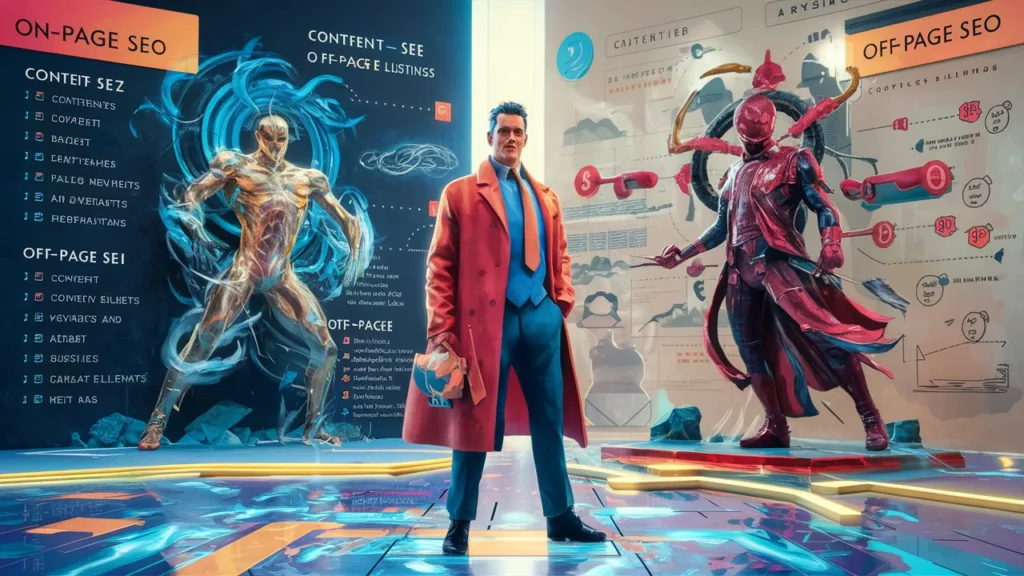Search Engine Optimization (SEO) is crucial for digital marketing. It helps websites rank higher on search engines like Google. Effective SEO strategies attract more visitors to your site. This can lead to increased engagement and conversions. There are two main types of SEO: on-page SEO and off-page SEO.

On-Page SEO
On-page SEO means optimizing elements on your website. This helps improve its visibility in search engine results. Here are some key aspects of on-page SEO:
Keywords
Keywords are words or phrases people type into search engines. They use them when looking for information. For example, if someone is looking for recipes, they might type “easy recipes” or “healthy meals.” Using relevant keywords in your content helps search engines understand your page. Weave these keywords into your text, headings, and meta descriptions.
Content
High-quality content is crucial for on-page SEO. Write original and informative articles, blog posts, or product descriptions. These should provide value to your readers. Good content keeps visitors on your site longer. This signals to search engines that your site is useful and relevant.
Title Tags
The title tag of a web page is an HTML element that specifies the title of the page. It appears in search engine results as the clickable headline for a given result. Each page on your website should have a unique title tag that includes your main keyword. This helps search engines and users understand what the page is about.
Headings
Use headings (H1, H2, H3, etc.) to structure your content. This makes it easier to read and understand. Headings break up the text into manageable sections. They provide a clear hierarchy of information. They also help search engines understand the main topics covered on your page.
Meta Descriptions
A meta description is a brief summary of your page’s content. It appears under the title tag in search engine results. A well-written meta description can attract more visitors. It gives them a clear idea of what to expect. It should include your main keyword. Make it enticing enough to encourage clicks.
Internal links
Linking to other pages on your website helps visitors find more content. It also keeps them on your site longer. This practice helps search engines crawl your site better. They can understand the relationships between different pages.
Images
Incorporating images in your content energizes and enhances its visual appeal. But, search engines cannot “see” images, so it’s important to add “alt text” to describe the image. This helps search engines understand what the image is about and can improve your site’s SEO.
URL Structure
Clear and descriptive URLs help search engines understand your web page content. URLs should include relevant keywords and be easy to read. For example, instead of a URL like “www.example.com/page1,” use “www.example.com/easy-recipes.”

Off-Page SEO
Off-page SEO involves activities outside your website to boost its search engine ranking. These activities help build your site’s reputation and authority. Here are some key aspects of off-page SEO:
Backlinks
Backlinks are links from other websites to your site. They are one of the most important factors in off-page SEO. When good websites link to yours, search engines think your content is good too. You get these links by making great stuff others want to link to, or by asking.
Social Media
Guest blogging is when you write for other websites in your field. Submitting your site to online directories helps it get seen more and get more backlinks.. It helps you reach new people and get links to your site, improving your SEO. Make sure to choose reputable directories that are relevant to your industry. This can also improve your local SEO if you have a business that serves a specific geographic area.
Influencer Marketing
Partnering with industry influencers spreads your content to more people. They’re trusted and have lots of followers, so when they like your stuff, more people notice you.
Forums and Communities: Join industry forums and communities. It helps you connect and get backlinks.
Share what you know and add links to your site when it fits, and you’ll get more visitors and better SEO.
Press Releases
Sending press releases about your website’s news helps more people notice you. This can lead to more backlinks and higher search engine rankings.
Review Sites
Encourage customers to review your business on sites like Yelp, Google My Business, and Trustpilot to improve your online reputation. Positive reviews can attract more visitors and help improve your search engine ranking.

Differences Between On-Page and Off-Page SEO
Understand the differences between on-page and off-page SEO for a balanced strategy.
Control
On-page SEO is entirely within your control. You can change your website anytime. Off-page SEO requires others to link to your site and share your content. It involves building relationships and external efforts.
Focus
On-page SEO focuses on optimizing your own website’s content and structure. Off-page SEO boosts your website’s reputation with links and social signals.
Techniques
On-page SEO means using keywords and good content. Off-page SEO means getting links and using social media.
Results
On-page SEO results can come fast because changes are instant. Off-page SEO takes longer because it requires external validation and relationship building.
Why Both Are Important
On-page SEO means using keywords, writing good content, and organizing your site well. Off-page SEO involves getting backlinks, using social media, guest blogging, and influencer marketing. Simplified: On-page SEO means using keywords and good content. Off-page SEO means getting links and using social media. Off-page SEO involves getting backlinks, using social media, guest blogging, and influencer marketing. Simplified: On-page SEO means using keywords and good content. Off-page SEO means getting links and using social media.

Tips for Success
Balance: Use a balanced approach by focusing on both on-page and off-page SEO. Neglecting one for the other can limit your site’s potential.
Quality: Always rank quality. Ensure your content, backlinks, and social media posts are great and useful for your audience.
Patience: SEO is a long-term strategy. Be patient and consistent with your efforts, and don’t expect overnight results.
Stay Updated: SEO changes often. Follow reliable blogs and forums to stay updated.
Check Results: Use tools like Google Analytics to track your SEO efforts. Analyze what is working and what is not, and make adjustments as needed.
Conclusion
SEO is crucial for any website that wants to succeed online. On-page SEO and off-page SEO are two key components of a successful SEO strategy. Understand and use both to make your website rank higher and get more visitors. Remember to focus on quality, be patient, and stay updated with the latest SEO techniques. Over time, your efforts will pay off, and your website will climb the search engine rankings.


